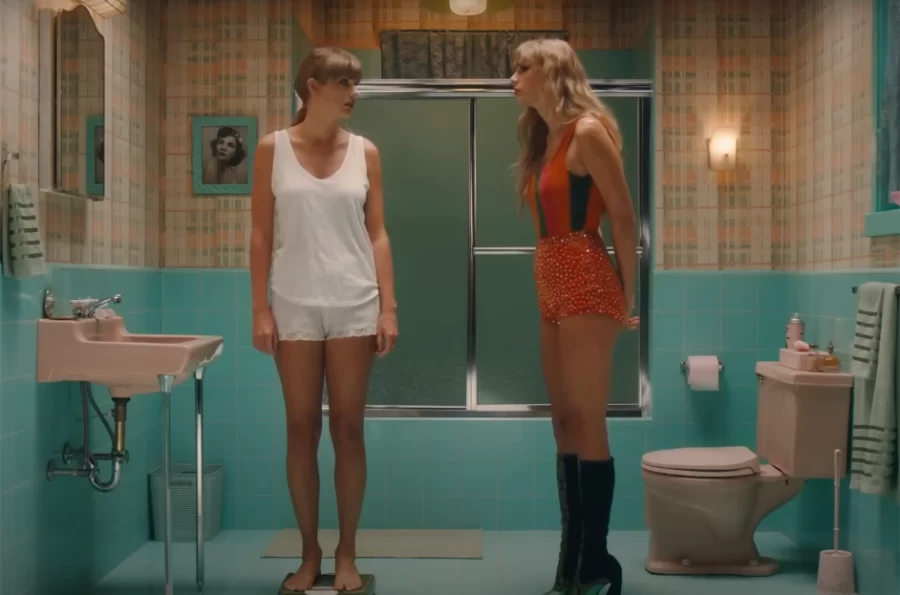Taylor Swift’s “Anti-Hero” and Anti-Fatness
November 4, 2022
“It’s me/Hi!/I’m the problem, it’s me,” Taylor Swift proudly proclaims on “Anti-Hero”—track three of her new album Midnights. The record celebrates Swift’s return to pop music with 80’s-inspired synths and catchy choruses, but she also delves into deeper and darker lyrical themes, one being body image. In “You’re On Your Own, Kid” Swift sings, “I hosted parties and starved my body/Like I’d be saved by the perfect kiss.” Most notably, in the music video for “Anti-Hero,” Swift steps on a scale that boldly reads “fat” in lieu of a number; her evil twin looks at the scale disapprovingly. Many were quick to call out Swift for promoting fatphobia and sending a harmful message to fans, while others rushed to defend her right to express her own experiences with body dysmorphia. Due to the backlash, Swift has removed the close-up shot of the scale from the music video on both YouTube and Apple Music. This discourse leads fans to wonder if Swift is really part of the “problem” in promoting fatphobia or if the problem is more complex.
In a now-viral TikTok, body neutrality activist Reyna Cohan criticizes Swift, stating, “Being fat is not a bad thing and in five seconds of your music video you have successfully reinforced the idea that it is.” She goes on to say, “Fat is not a feeling! And feeling fat or fearing being fat or not liking the way you look…does not mean that you deal with the systemic issues that actual fat people actually deal with.” It is true that in society fat is given a negative connotation, being used to mean ugly or undesirable. People constantly claim that they “feel fat” when they really mean that they are not happy with their appearance, but as Cohan points out, fat is not a feeling. Being fat is a neutral quality that society has deemed bad, and we should work to actively dismantle assigning value—positive or negative—to our bodies. Further, Cohan asserts that fat people deal with systemic prejudices in Western society, and Swift has never lived in an objectively fat body and experienced these issues. Through including the scale reading “fat,” though, Swift reinforces the idea that there is something wrong with being fat. This value that she assigns, critics argue, sends the message to young fans that fatness should be feared.
However, others have argued that Swift has the right to express her own experiences with disordered eating and insecurities. Swift has previously opened up about struggling with food and body image partly due to the pressure of being in the spotlight. In her 2020 documentary Miss Americana, she described how seeing headlines of people saying she looked pregnant would trigger her to stop eating. Fans argue that since Swift has struggled with these issues, she should be allowed to explore her struggles through her music. These struggles are also relatable to many fans, and it can be comforting to know that their favorite artist also grapples with similar issues. It is also important to note that within the larger context of the music video, Swift is criticizing these destructive thoughts. Throughout the music video Swift addresses how we can be our own anti-heroes, with an evil twin (metaphorically for us, literally for Swift in the video) encouraging us to engage in unhealthy behaviors. In acknowledging how we promote these harmful behaviors, Swift arguably attacks the ways we reinforce destructive thoughts like fatphobia.
Therefore, the issue of “Anti-Hero” and anti-fatness is not black and white. On one hand, Swift is reinforcing the notion of fatness as undesirable; on the other, she is expressing her personal struggles and criticizing destructive thought patterns. The latter requires context, though, that may be missing without viewing the full music video and analyzing it through a critical lens. Fans—especially younger ones—may lack this finesse, but does that mean Swift is at fault? To what extent should artists have to censor themselves to protect fans? If we assert that artists cannot express deep, dark struggles through their art, we are stripping them of this creative outlet, but we also do not want to continue to perpetuate harmful ideas without the nuance that complex topics require. Fatness is a nuanced issue. It is not inherently bad, and yet society has brainwashed us into treating it as such. Swift, therefore, is not the problem—we all are. Everyone struggles between what they know to be true regarding the value of appearances and how larger beauty standards make them feel. Artists such as Swift should address this complex issue, but it needs to be handled with context, nuance, and care to shift the narrative instead of reinforcing it.

